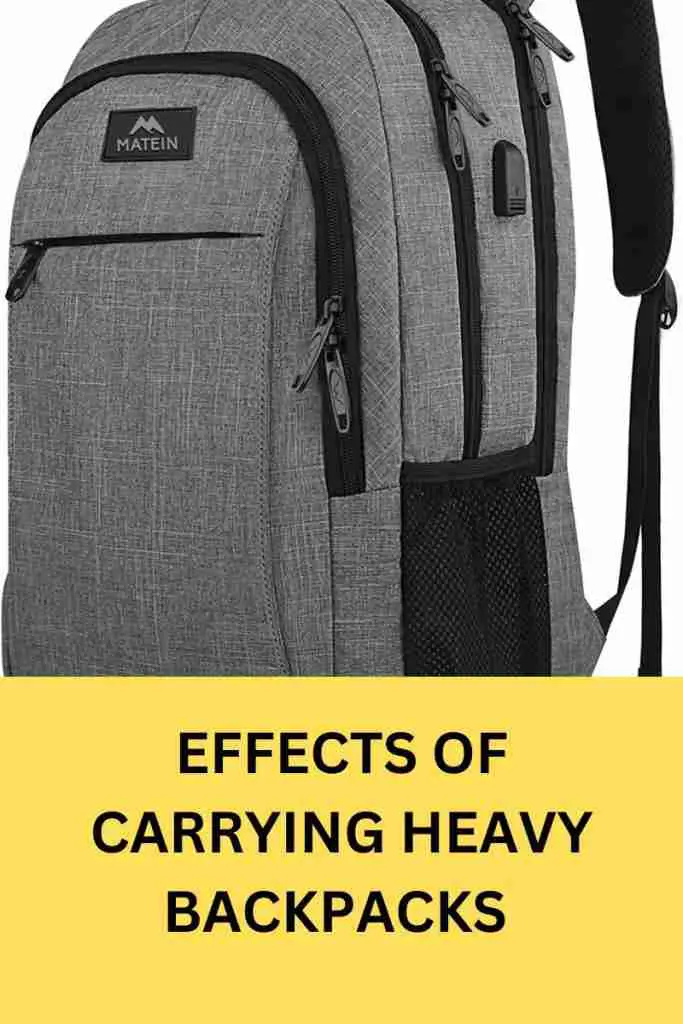The effects of carrying a heavy bag on one shoulder can be difficult to bear. Certain bags can be heavy for more than just the physical weight, especially being on one shoulder.
For example, in this article: can you carry a crossbody bag on one shoulder? lays the foundation for the effects of carrying heavy bags frequently.
It’s no wonder that a few people have tried to find different ways to carry heavier bags, and with them, to avoid some of the issues that follow.
Therefore, it is essential to know the effects to take preventive measures when carrying such heavy bags.
This article provides the effects of the use of heavy bags on one shoulder.
Table of Contents
HEAVY PURSE SYNDROME
Heavy purse syndrome simply means the physical aches and pain individual experiences from carrying a heavy handbag, backpack, or purse constantly.

This action can lead to tension and strain in the muscles of the neck, shoulders, and back, and may lead to shoulder pain, chest pain, and headaches.
So, who does this heavy purse syndrome affect? To data and research, it tends to affect women more because they carry shoulder bags and other types of bags on a daily basis as men have different types of purses.
However, be it male or female, one thing is certain; if you carry heavy bags or purses constantly, the weight of the bag can cause the muscles to work harder to maintain balance, leading to muscle tension and fatigue.

To avoid heavy purse syndrome, it is recommended to limit the weight of your bag to less than 10% of your body weight, regularly switch the side on which you carry the bag, and use a backpack or a bag with a wider strap to distribute the weight more evenly.
Engaging in regular exercises to strengthen the muscles of the neck, shoulders, and back can also help to prevent the development of this syndrome.
EFFECTS OF CARRYING A HEAVY BAG ON ONE SHOULDER

There are 4 major effects of carrying a heavy bag on one shoulder and they are:
- constant ache
- sore muscles or muscle tenderness
- stiff shoulder
- Referred pain
Constant ache: The heavier the weight the harder it is for your muscles to adjust to holding it. If you keep carrying heavy bags on the same side of the body, you’re bound to end up with a back or shoulder injury or something worse.
Sore muscles/ Muscle tenderness: This means that if you lift or carry heavy bags on one shoulder all the time your arms get tired. Your arms begin to hurt and eventually you have trouble keeping them steady.
Stiff shoulders: If you carry heavy bags on one side of your body, you are bound to end up with stiff shoulders. When this happens you may find yourself being unable to lift heavy things, like books, or even light weights for that matter.
Referred pain: If you carry heavy bags on your shoulder all the time then you may suffer from pain in some part of your body, whether your head, neck, or other joints. This can happen anywhere from minor to major pain.
EFFECTS OF CARRYING HEAVY BACKPACKS

There are 6 major effects of carrying heavy backpacks, they are;
- Muscle strain
- Spine compression
- Nerve Damage
- Posture Problems
- Fatigue
- Joint Damage
Muscle Strain; Carrying a heavy backpack can strain the muscles in your neck, shoulders, and back, leading to pain and discomfort.
Spine compression: Carrying a heavy backpack can compress the spine, leading to back pain and even spinal injuries over time.
Posture problems: A heavy backpack can cause you to lean forward or slouch, leading to poor posture. This can contribute to back and neck pain and affect your balance.
Nerve damage: If a backpack is too heavy or worn improperly, it can compress nerves and cause numbness or tingling in the arms and hands.

Fatigue: Carrying a heavy backpack can be tiring, leading to reduced energy levels and decreased productivity.
Joint damage: The weight of a heavy backpack can put stress on your joints, leading to pain and damage over time.
To prevent these effects, it is important to choose a backpack that is the right size and weight for your needs and to wear it properly with both straps securely fastened and the weight distributed evenly across your shoulders and hips.
It is also a good idea to take breaks and stretch your muscles regularly if you need to carry a heavy load for an extended period.
CAN A HEAVY PURSE/BAG CAUSE SHOULDER PAIN?
Be it shoulder pain, back pain, or chest pain, one common factor in all of these is heavy items like handbags or purses. Naturally we all experience hurt shoulders when we carry heavy bags over a prolonged time.
So, can a heavy purse or handbag cause shoulder pain? Yes, carrying a heavy purse/bag can cause shoulder pain especially when it is worn on one shoulder as this action causes your shoulders to be misaligned leading to muscle tension, pain, and strain.

In addition, this heavy purse or bag makes your shoulder work harder to support the weight of the purse or handbag.
In severe cases, carrying heavy handbags on one shoulder can lead to nerve compression, which can cause tingling or numbness in your arms and hands.
Repeatedly carrying heavy bags over time can also cause chronic shoulder pain and may lead to more serious shoulder injuries, such as rotator cuff tears or shoulder impingement syndrome.

So, what is the way out of shoulder pain with heavy purses or handbags?
We recommend you lighten your load, switch to a smaller handbag, or carry your bag on both shoulders to distribute the weight evenly.
Furthermore, you can also try using a backpack instead of a shoulder bag, which can help distribute the weight more evenly and reduce strain on your shoulders.
Finally, make it a practice of performing regular shoulder stretches, exercises, and good postures to improve your shoulder flexibility and strength, reducing the risk of a shoulder injury and pain.
CAN CARRYING HEAVY BAGS CAUSE CHEST PAIN?

One thing is certain, there are always effects of carrying heavy bags on one shoulder and for a prolonged period of time, so apart from a shoulder injury or shoulder pains from carrying heavy bags, what about chest pain?
So, does carrying heavy bags cause chest pain? The short answer is yes, carrying heavy bags can cause chest pain because heavy bags carried over a long period of time puts strain on your chest and joints causing chest pain and discomfort.
In addition, the heavy bag also affects the back, shoulder, and chest muscles to work harder to support the weight of the bag which now leads to fatigue and strain.
Apart from heavy bags causing chest pain, they can also affect your posture, increase your blood pressure, and increase your heart rate, nausea, and dizziness.
Extreme effects of carrying heavy bags can also lead to shortness of breath and palpitation, especially for individuals with pre-existing heart conditions.
Later in this article, I will talk about proven techniques on how to carry heavy bags or objects so you don’t put pressure on the chest muscles thereby causing chest pain
Finally, if you experience chest pain when carrying heavy bags or any other activity, it is always best to seek medical advice to rule out any underlying health conditions.
CARRYING HEAVY THINGS ON SHOULDER

Carrying a heavy bag on the shoulder is no good. Not only does it slow you down, but it also affects your muscles, shoulder blade, upper back, and neck.
Stressing your shoulders every time will make them get too sore and is just as bad for your health, so to prevent that from happening, you’re going to have to carry less weight on your shoulders.
HOW TO CARRY HEAVY BAGS

Carrying heavy bags can be a challenge, but there are some techniques you can use to make it easier and prevent injury. Here are some tips:
Use proper lifting technique: Stand close to the bag, bend at the knees, and lift with your legs, not your back. Keep your back straight and lift the bag smoothly and slowly.
Distribute the weight evenly: If you have multiple bags, try to distribute the weight evenly between them. This will help you maintain your balance and prevent strain on one side of your body.
Hold the bags close to your body: Holding the bags close to your body will help you maintain better control and reduce the strain on your arms and back.
Use a luggage cart or dolly: If you have to move a lot of heavy bags, consider using a luggage cart or dolly. This will reduce the amount of weight you have to carry and make it easier to move the bags around.
Take breaks: If you have to carry heavy bags for a long distance, take breaks and rest as needed. This will help prevent fatigue and injury.
Remember, it’s important to listen to your body and not overexert yourself when carrying heavy bags.
If you experience pain or discomfort, stop and rest, or seek help from someone else.
HOW TO CARRY A HEAVY DUFFLE BAG

There are about 5 major ways to carry a heavy duffle bag so that you don’t hurt your shoulder, they are;
- Use the shoulder strap attached to the duffle bag for easy distribution of weight evenly across your body.
- Using a luggage cart to transport your heavy duffle bag is one of the best techniques.
- It is always good practice to always bend your knees when you are lifting a heavy bag, when you do this, you use your legs to lift the weight, rather than your back.

- Another technique to use in lifting a heavy duffle bag is to use both hands
- Take frequent breaks: If you are carrying a heavy duffle bag for an extended period of time, take frequent breaks to rest your muscles and avoid strain or injury.
ARE CROSSBODY BAGS BAD FOR YOUR BACK?

It is not a good practice to wear heavy crossbody bags consistently or wear them improperly because this can lead to strain on your shoulders, neck, and back, muscle imbalance, and posture issues.
So, yes, crossbody bags can be bad for your back but if you stick to carrying a lightweight crossbody bag with few items, you will be comfortable and avoid back and shoulder pain.
In addition, to avoid any kind of pain with crossbody bags, we recommend you select a crossbody bag with wide straps as this helps with distributing the weight of the bag evenly thereby reducing strain on your back.
Furthermore, always learn to switch sides when you carry a heavy crossbody bag to prevent severe pain in your shoulders and back.
CARRYING BACKPACK ON ONE SHOULDER?
Yes, you can carry your backpack on one shoulder but it is not recommended you carry your backpack on one shoulder for a long time especially a heavy backpack as this will lead to discomfort and shoulder and neck pains.
Carrying a heavy backpack on one shoulder can also cause the spine to twist, leading to poor posture and potential spinal misalignment.
This can also put extra pressure on the hips and knees, leading to discomfort and potentially even injury.
Finally, we recommend you wear your backpack with both straps to distribute the weight and prevent pain of any sort.
MESSENGER BAG SHOULDER PAIN

Can a messenger bag cause shoulder pain? Yes, a messenger bag can cause shoulder pain if it is not carried properly or if it is overloaded.
A messenger bag is designed to be worn across the body, with the weight of the bag resting on one shoulder.
So if the weight of the messenger bag is not distributed evenly, it can cause strain on the shoulder and neck muscles, leading to pain and discomfort.
Don’t put excessive pressure on your shoulder joints and muscles by overloading your messenger bag.
ARE SHOULDER BAGS BAD FOR YOU?
Generally, there is nothing wrong with shoulder bags but to avoid misalignment of your shoulders, the curvature of the spine, and pain in your neck, back, and shoulders, we recommend you do not carry a heavy shoulder bag consistently.
Always wear your shoulder bags correctly, pick one that meets your need, and go for other alternative bags that can distribute weight across the body like a backpack or crossbody bag.
HEADACHE FROM CARRYING A HEAVY BAG
The stress and strain that heavy bags cause on the human body can send discomfort to the brain causing headaches. This headache is therefore attributed to the pain caused by carrying heavy bags.
LOWER BACK PAIN AFTER CARRYING A HEAVY BAG
A large weight over your shoulder can ravage your back by putting extreme pressure on the vertebrae and spine leading to muscle strain, stress, and other medical conditions.
It is no wonder why some people have been suffering from neck pain and headaches for quite some time, due to the effects of heavy bags over the shoulder.
HURT SHOULDER FROM CARRYING A HEAVY BAG
Carrying a heavy bag can cause the shoulder to ache and hurt. This burning sensation can be felt on the shoulders.
A dull throbbing sensation will appear there, then spread throughout the connected tissues until it becomes unbearable. It will become even worse with every movement.
SHOULDER PAIN CARRYING HEAVY OBJECTS
The tendons can rupture in the process of lifting heavy objects. This continuous act is enough to force a tear down the seam that connects the tissues causing intense pain.
Below are frequently asked questions on the effects of carrying a heavy bag on one shoulder:
WHY DOES MY SHOULDER HURT AFTER CARRYING HEAVY BAG?
Your shoulders hurt after carrying a heavy bag because of the pressure that has been exerted on it.
CAN A HEAVY HANDBAG CAUSE SHOULDER PAIN?
Yes, a heavy handbag can cause shoulder pain.
CAN CARRYING HEAVY BAGS CAUSE NERVE DAMAGE?
Yes, carrying heavy bags over time can cause damage to the nerve.
CAN CARRYING HEAVY BAGS CAUSE SIDE PAIN?
Carrying heavy bags can cause asymmetrical pain on one side.
CONCLUSION
Shoulder pain has been associated with carrying heavy bags and one of the effects of that is a shoulder ache that can extend to other parts of the body.
It is important to know and take precautions when lifting or carrying heavy loads or bags, as there could be other consequences than just some minor muscle spasms.
Lastly, if you have experienced any pain due to lifting or carrying heavy objects, do not carry heavy weight around, especially if it is heavier than 20 kg for men and 15kg for women.
